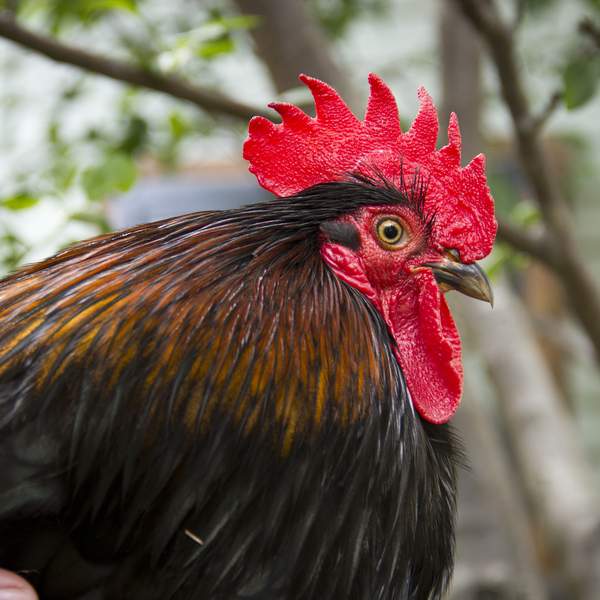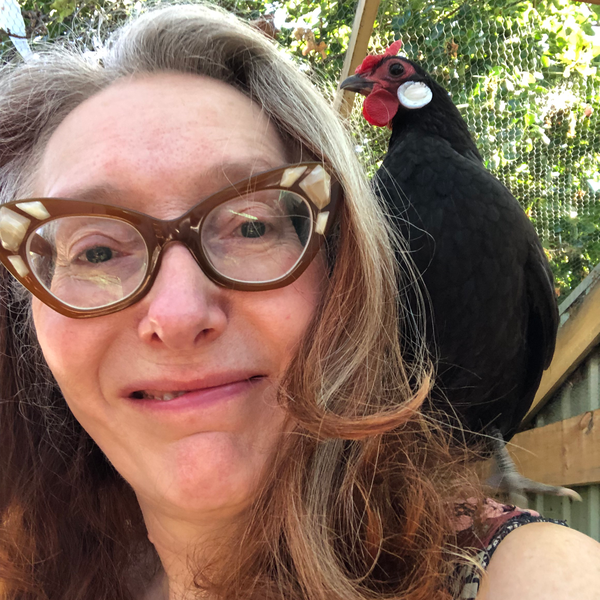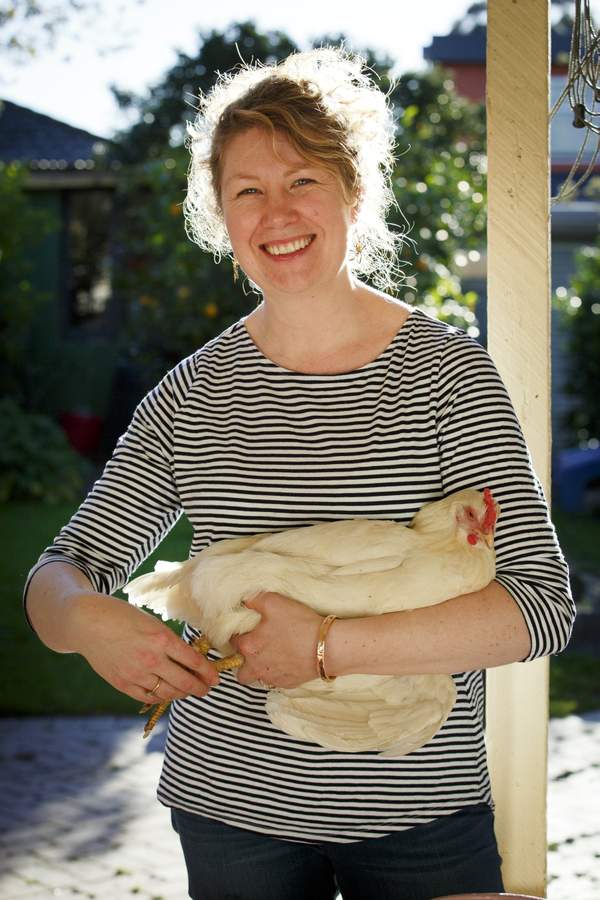Chicken Love

Spring is as good a time as any to get yourself some chooks! Triple R ‘hensperts’ Fiona Scott-Norman and Jessamy Miller, explain how backyard chickens can be true pets who love you back if you treat ‘em right…
Photos by Marcel Aucar & Jessamy Miller
Can Your Chickens Love You Back?

Fiona Scott-Norman
Three years back, when our chook book, This Chicken Life, came out, photographer Ilana Rose and I were doing the publicity rounds. We had a whole day booked in at the ABC, including on breakfast TV, and I’d brought Val, my beloved Rosecomb bantam, in as part of the circus. She perched on my hand in the TV studio, snuggled in my lap, snoozed in between interviews, pecked the console buttons, pooped on Harry Angus from Cat Empire, made all the right ‘buck buck bucking’ sounds in the background; it was a big day for a little chicken.
A country friend who knows his chooks saw the TV spot, asked a few questions about proceedings, then nodded and commented: “Yup. Figured as much. She must really love you to put up with all that shit.”
Chickens make excellent pets. Val did love me, as it happened, and I loved her right back. Probably because she was always NQR. Almost on hatching she came down with a hideous respiratory infection, and I wrapped her in a blankie and fed her mealworms. She peeped miserably for days, but then survival kicked in and she decided I was Mum, flew at my neck and snuggled in. Later, she’d get lost every night on her way into the coop. She’d aim at the door, but would land on the roof and sigh, and I’d come out, cuddle her, have a chat, put her inside. Chicken cuddles every night! So good. Miss that chicken (goddam fox).
My current fave is another Rosecomb, Sister BB, an indirect but absolute 3RRR homage. She’s a pushy, curious, dominant little chook, who flies up onto my shoulder to chat, and makes sure she’s getting treats before all those other bitches (the BB stands for ‘Bossy Boots’). BB is middle of the pecking order, but generates constant drama as she hustles with invention and futility – a tireless Wiley Coyote – to usurp top chooks Karen and Salty. A one-chicken cartoon villain entertainment package. You bet I spoil her.
Not all chickens will be your BFFF (Best Feathered Friend Forever), but most flocks contain one or two candidates. Not all chooks particularly like people, some prefer hanging with their crew, some are afraid of us (FAIR, let’s be honest), some are obnoxious, and some, look, are not the smartest tools in the shed.
Intelligent chooks are your best bet. The curious, fearless ones who want to know your business. Or placid breeds like Silkies or Pekins; you can pick ‘em right up. Or the weird chook who doesn’t fit in because they’re a bit wonky, or small, or can’t find the coop door at night. If you’re kind, and offer company, relationship, cuddles and treats – if they can trust you – (start humming the Neighbours theme now), “That’s when good chickens become good friends.”
Tips for Taming Your Feathered Friends

Jessamy Miller
I grew up on a chook farm and have been keeping chooks ever since, along with being a chicken journalist and presenting This Chicken Life with Fiona over summer. I have five backyard chooks here in the inner city, and my favourite two are Peaches and Creamy, Pekin bantams I hatched in an incubator and brought up in the corner of the lounge room. They live outside now, happily, but they still think I am their Mum and like to preen my feathers, neaten up my shirt and investigate my sneakers when we are outside together.
Keeping chickens is much more fun when they like you. If you create a bond with them, chooks will be easier to manage, and more relaxed and interactive. Chooks have their own personalities and some are not cut out to be cuddly. Others are delighted to socialise with humans, especially if they have been given lots of handling when they were young. These are the ones that win your heart and become lap chooks. Regardless of their vibe though, they can become tamer through consistent and gentle management over time.
Chooks are prey animals who are easily alarmed, so to build trust, always behave in a quiet and predictable manner around them. This means moving slowly around the henhouse, and allowing fowls to approach you rather than dashing after them. Talking to chooks in a low voice is particularly effective at relaxing and reassuring them. It might also provide a laugh for neighbours, but that’s just a side benefit. I have a special animal voice that I inherited from my Nana and always use it when I’m with my chooks.
Building trust doesn’t happen overnight and requires time together. Enjoy the journey by regularly taking a cuppa, kombucha or cocktail out to sit and watch the girls. I have a garden seat near the poultry run, and I also let the chooks out to keep me company whenever I’m in the garden. Time with chooks is a guaranteed mood boost; highly recommended after a hectic day at work.
The key to a chook’s heart is food so to become their favourite human, you will need snacks. They will already feel warmly towards the hand that feeds them, but true love can be built on handing out healthy treats like sliced watermelon, corn on the cob or plain yoghurt. Alternatively, hang a lettuce for them to jump up and peck. Treat toys filled with grains or a bale of pea straw to scratch through will also win points with the flock. Once you are associated with food in a chook’s mind, you can train them to come at your call, be locked up at certain times, and even, if you have the time, do tricks like peck at a xylophone. Just keep the food rewards consistent to reinforce the behaviour you want.
Everyone knows chooks are faster than humans over short distances. To catch a chook, either wait until dark and remove them from the perch without fuss, or slowly and calmly herd them into the corner of a shed or fence line and pick them up. If children are visiting, explain that a chook who walks or runs away is saying, “No thank you”, and should not be pursued. Encourage kids to sit quietly holding a handful of treats and let the hens approach them. This is a consensual approach that can be applied to many other animals as well.
Chooks are intelligent, and with calm, predictable management and judicious use of treats, your fluffy feather dusters will be happy to be in your company. Between my overworked spouse and snarky teenagers, I find the chooks’ enthusiasm at seeing me and my food bucket an absolute balm to the soul.
Fiona’s book This Chicken Life is available to order at The Chestnut Tree bookshop in Footscray. Fiona and Jessamy present This Chicken Life as a summer fill on Triple R and also talk chooks on Breakfasters once a month in the Creature Feature Creatures segment. This piece first appeared in the Radiothon 2022 edition of Triple R’s subscriber magazine The Trip.